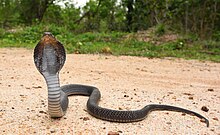เห่า
Jump to navigation
Jump to search
See also: เหา
Thai[edit]
Pronunciation[edit]
| Orthographic/Phonemic | เห่า e h ˋ ā | |
| Romanization | Paiboon | hào |
| Royal Institute | hao | |
| (standard) IPA(key) | /haw˨˩/(R) | |
Etymology 1[edit]
From Proto-Tai *ʰrawᴮ (“to bark”). Compare Middle Chinese 吼 (MC xuwX|xuwH, “to roar; to shout”). Cognate with Northern Thai ᩉᩮᩢ᩵ᩣ, Lao ເຫົ່າ (hao), Lü ᦠᧁᧈ (ḣaw¹), Tai Dam ꪹꪬ꪿ꪱ, Tai Dón ꪹꪬꪱꫀ, Shan ႁဝ်ႇ (hào), Tai Nüa ᥞᥝᥱ (hǎw), Phake ꩭွ် (haw), Ahom 𑜑𑜧 (haw), Zhuang raeuq, Nong Zhuang haeuq, Zuojiang Zhuang haeuq.
Verb[edit]
เห่า • (hào) (abstract noun การเห่า)
- (of a dog or similar) to bark.
- (archaic, of a cobra or similar) to hiss.
- (slang, offensive, derogatory) to speak; to talk.
Derived terms[edit]
Related terms[edit]
- หอน (hɔ̌ɔn)
Etymology 2[edit]

Cognate with Lao ເຫົ່າ (hao), Tai Dam ꪹꪬ꪿ꪱ, Shan ႁဝ်ႇ (hào).
Noun[edit]
- (งู~) cobra: snake of the genus Naja.
- (figurative) (งู~) evil, harmful, malicious, treacherous, or unfaithful person.